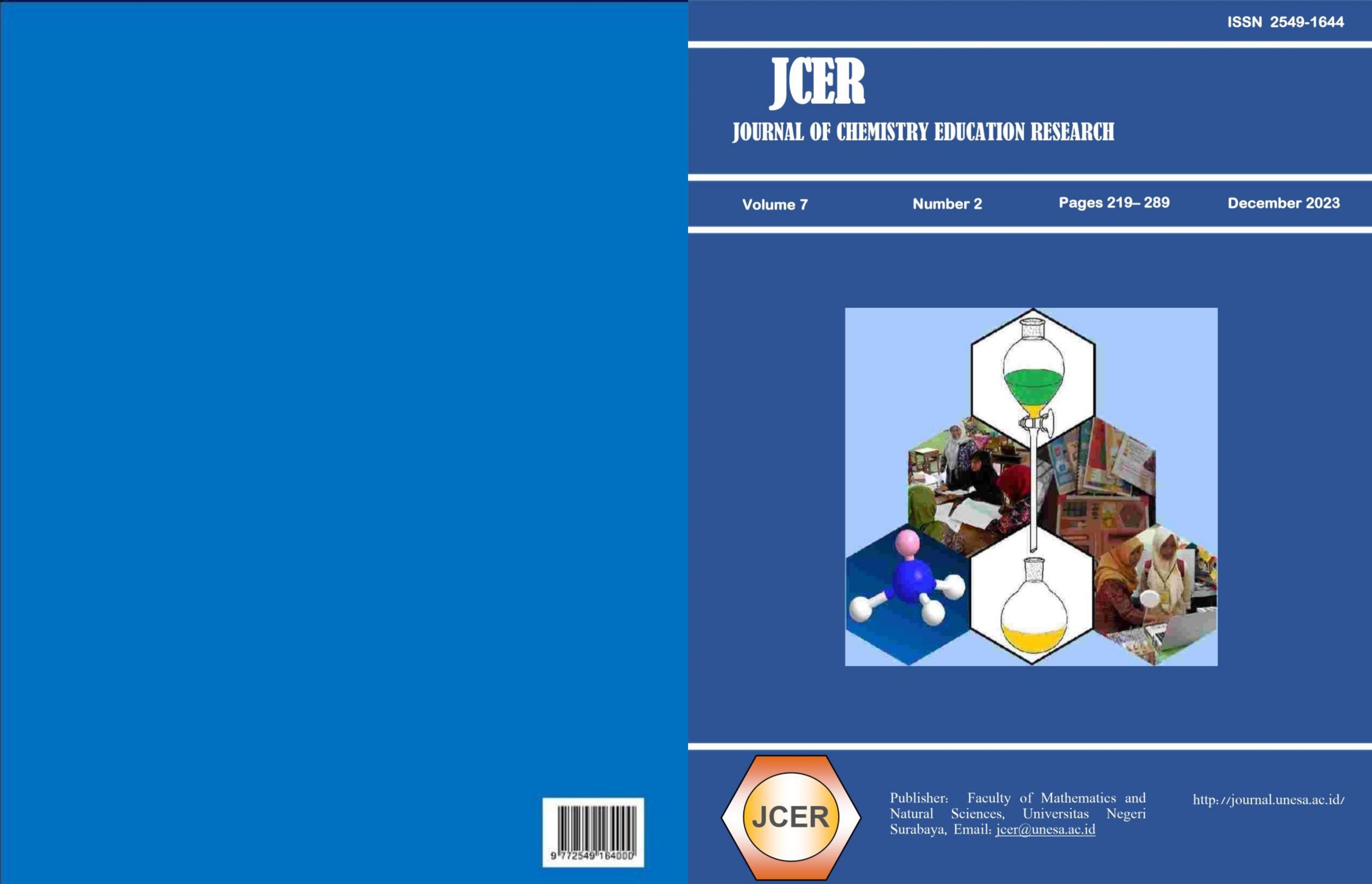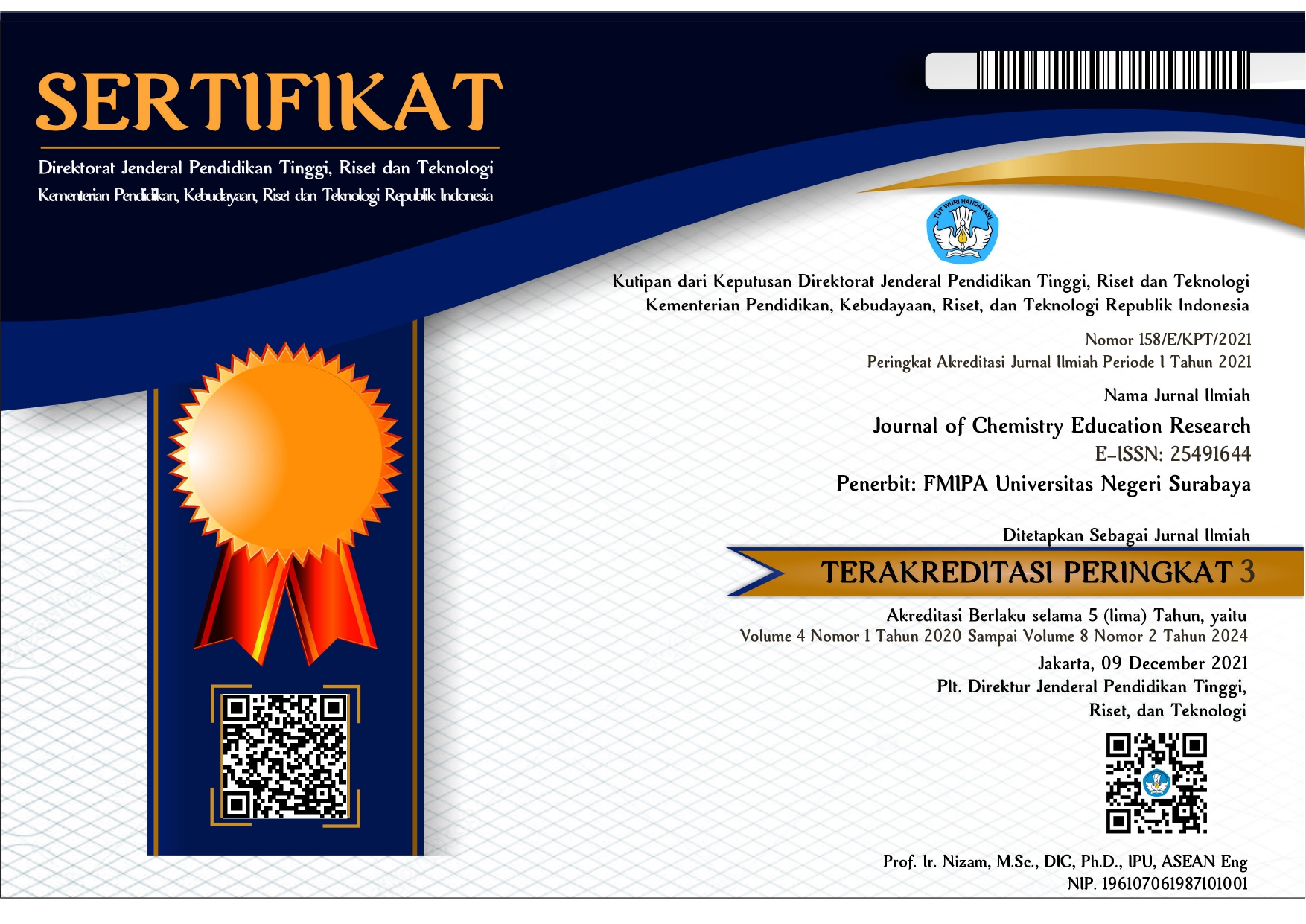Development of Student Worksheet with Guided Discovery Oriented to Train HOTS on Thermochemistry Matter
DOI:
https://doi.org/10.26740/jcer.v7n2.p227-236Keywords:
Student Worksheet with Guided Discovery Oriented, HOTS, ThermochemistryAbstract
This research purpose to describe the feasibility of student worksheet with guided discovery oriented to train HOTS on thermochemistry matter. Research metodology that used based on Sugiyono (2016) which consist of 10 stages, but this research is limited to product trial stages. The result shows that the student worksheet is feasible on the validity aspect which viewed from content validity and construct validity. The content validity get percentage of 85.76% for student worksheet 1 and 85.91% for student worksheet 2. The construct validity obtained percentage of 87.16% for student worksheet 1 and 2. Practicality aspect is viewed from student responses that get percentage in range 75-100% and observation of students activities shows that overall relevant activities are greater than not relevant activities. Effectiveness aspect is viewed from the students HOTS test result that get gain score in range 0.58-0.96 and knowledge domain test result with >80% of classical completeness.References
George-Williams, S. R., Soo, J. T., Ziebell, A. L., Thompson, C. D., & Overton, T. L. (2018). Inquiry and Industry Inspired Laboratories: the Impact on Students' Perceptions of Skill Development and Engagements. Chemistry Education Research and Practice, 9, 583-596.
Mamlok-Naaman, R., Eilks, I., Bodner, G., & Hofstein, A. (2018). Advances in Chemistry Education Series No. 1, Professional Development of Chemistry Teachers: Theory and Practice. United Kingdom: the Royal Society of Chemistry.
Retno, A. T., Saputro, S., & Ulfa, M. (2018). Properness Test: Development of an Inquiry-Based Learning Module to Improve Science Literacy in Thermochemistry Subject. The 8th Annual Basic Science International Conference (hal. 1-8). Surakarta: AIP Publishing.
Dingrando, L., Gregg, K., Hainen, N., & Wistorm, C. (2004). Chemistry: Matter & Change, Student Edition (GLENCOE CHEMISTRY) 2nd Edition. USA: McGraw Hill.
Susparini, N. T., Ashadi, & Masykuri, M. (2016). Pengaruh Model Pembelajaran Inkuiri Terbimbing dan Inkuiri Bebas Termodifikasi pada Materi Termokimia terhadap Keterampilan Berpikir Tingkat Tinggi dan Hasil Belajar Siswa Kelas XI SMA Negeri 1 Sukoharjo Tahun Pelajaran 2015/2016. Jurnal Pendidikan Kimia, 5(2), 44-51.
Sani, R. A. (2019). Pembelajaran Berbasis HOTS (Higher Order Thinking Skills). Tangerang: Tira Smart.
Anderson, L., & Krathwohl, D. (2001). A Taxonomy for Learning, Teaching, and Assessing. England: Longman.
Nugroho, R. A. (2018). HOTS (Kemampuan Berpikir Tingkat Tinggi: Konsep, Pembelajaran, dan Soal-soal). Jakarta: PT Gramedia Widiasarana Indonesia.
Tajudin, N. M., & Chinnappan, M. (2016). The Link between Higher Order Thinking Skills, Representation, and Concepts in Enhancing TIMSS Tasks. International Journal of Instruction, 9(2), 119-214.
Fakhomah, D. N., & Utami, M. S. (2019). Pre-Service English Teacher Perception about Higher Order Thinking Skills (HOTS) in the 21st Century Learning. International Journal of Indonesian Education and Teaching, 3(1), 41-49.
Riyana, C. (2012). Media Pembelajaran. Jakarta: Direktorat Jenderal Pendidikan Islam, Kementrian Agama RI.
Asri, D. Z., Novita, D., & Yonata, B. (2017). The Development of Student Worksheet with Contextual Teaching and Learning Oriented on Thermochemical Matter to Train Student Critical Thinking Skills. Unesa Journal of Chemical Education, 66-73.
Prahasta, F. L., Agustini, R., & Hidayah, R. (2018). Development of Student Worksheet Based on Guided Inquiry Model with KIT Instrument of Reaction Rate Matter to Train the Science Process Skills in XI Grade Senior High School 1 Cerme. Unesa Journal of Chemical Education, 52-57.
Zulaicha, A. S., Fadiawati, N., & Tania, L. (2016). Pengembangan Lembar Kerja Siswa Berbasis Pendekatan Saintifik pada Materi Termokimia. Jurnal Pendidikan dan Pembelajaran Kimia, 179-190.
Verdina, R., Gani, A., & Sulastri. (2018). Improving Student's Higher Order Thinking Skills in Thermochemistry Concept Using Worksheets Based on 2013 Curriculum. Journal Of Physics, 1-6.
Yonata, B., Tjahjani, S., & Novita, D. (2018). Student's Creativity and High-Order Thinking Skills in Laboratory Activity of Surface Chemistry. Proceedings of Mathematics, Informatics, Science, and Education International Conference (MISEIC 2018). 157, pp. 54-58. Surabaya: Atlantis Press.
Ghani, I., Ibrahim, N., Yahaya, N., & Surif, J. (2017). Enhancing Students' HOTS in Laboratory Educational Activity by Using Concept Map as an Alternative Assessment Tool. Chemistry Education Research and Practice, 18, 849-874.
Kemendikbud. (2016). Peraturan Menteri Pendidikan dan Kebudayaan Republik Indonesia Nomor 22 Tahun 2016 tentang Standar Proses Pendidikan Dasar dan Menengah. Jakarta: Kementerian Pendidikan dan Kebudayaan.
Riandari, F., Susanti, R., & Suratmi. (2018). The Influence of Discovery Learning Model Application to the Higher Order Thinking Skills Student of Srijaya Negara Senior High School Palembang on the Animal Kingdom Subject Matter. Journal of Physics: Conference Series, 1-8.
Rudibyani, R. B., & Perdana, R. (2018). Enhancing Higher-order Thinking Skills using Discovery Learning Model's on Acid-Base pH Material. International Conference on Science and Applied Science (pp. 1-10). Surakarta: AIP Publishing.
Aswardi. (2017). The Implementation of Guided Discovery Learning Method to Improve Student Learning Outcomes at Electromagnetic Control System and Operation Course. The International Journal of Counseling and Education, 2(2), 85-91.
Batubara, I. H. (2019). Improving Student's Critical Thinking Ability Through Guided Discovery Learning Methods Assisted by Geogebra. International Journal for Education and Vocational Studies, 1(2), 116-119.
Martaida, T., Bukit, N., & Ginting, E. M. (2017). The Effect of Discovery Learning Model on Student's Critical Thinking and Cognitive Ability in Junior High School. IOSR Journal of Research & Method in Education, 7(6), 1-8.
Slavin, R. E. (2006). Educational Psychology: Theory and Practice 8th Edition. Boston: Pearson.
Sugiyono. (2016). Metode Penelitian Kuantitatif, Kualitatif, dan R&D. Bandung: Alfa Beta.
Riduwan. (2015). Skala Pengukuran variabel-variabel Penelitian. Bandung: Alfabeta.
Hake, R. R. (1998). Interactive-engangement versus traditional methods: A six-thousand-student survey of mechanics test data for introductory physics courses. American Journal of Physics, 66(1), 64-74.
Badan Standar Nasional Pendidikan. (2014). Penilaian Buku Teks Pelajaran Kimia untuk Siswa SMA/MA. Jakarta: BSNP.
Depdiknas. (2008). Panduan Pengembangan Bahan Ajar. Jakarta: Departemen Pendidikan Nasional.
Tro, Nivaldo J. (2017). Chemistry : A Molecular Approach 4th Edition. Boston : Pearson.
Kotz, J. C., Treichel, P. M., & Townsend, J. R. (2012). Chemistry and Chemical Reactivity, Eight Edition. USA: Brooks/Cole.
Widjajanti, E. (2008). Kualitas Lembar Kerja Siswa. Pelatihan Penyusunan LKS Mata Pelajaran Kimia Berdasarkan Kurikulum Tingkat Satuan Pendidikan Bagi Guru SMK/MAK (hal. 1-7). Yogyakarta: Kimia FMIPA UNY.
Waseso, H. P. (2018, Januari). Kurikulum 2013 dalam Perspektif Teori Pembelajaran Konstruktivis. Ta'lim : Jurnal Studi Pendidikan Islam, 1(1), 59-72.
Ariyana, Y., Pudjiastuti, A., Bestari, R., & Zamroni. (2019). Buku Pegangan Pembelajaran Berorientasipada Keterampilan Berpikir Tingkat Tinggi. Jakarta: Kementrian Pendidikan dan Kebudayaan.
Aisyah, D., & Yonata, B. (2019). The Development of Student Worksheet to Train Critical Thinking Skills in Acid Base Matter for Senior High School in 11th Grade. Unesa Journal of Chemical Education, 8(3), 340-349.
Wulandari, S., Lestari, H., & Fachlevy, A. F. (2017). Faktor yang Berhubungan dengan Kejadian Obesitas pada Remaja di SMA Negeri 4 Kendari Tahun 2016. Jurnal Ilmiah Mahasiswa Kesehatan Masyarakat, 1(3), 1-13.
Szalay, L., Toth, Z., & Kiss, E. (2020). Introducing Students to Experimental Design Skills. Chemistry Education Research and Practice, 21, 331-356.
Arends, R. (2012). Learning to Teach 9th Edition. New York: Mc Graw Hill.
Brooks, J. G., & Brooks, M. G. (1999). In search of understanding : the case for constructivist classroom. Virginia: ASCD.
Woolfolk, A. (2016). Educational Psychology, THIRTEENTH EDITION. USA: Pearson Education.
Yuliati, S. R., & Lestari, I. (2018). Higher-Order Thinking Skills (HOTS) Analysis of Students in Solving HOTS Question in Higher Education. PERSPEKTIF Ilmu Pendidikan, 32(2), 181-188.
Downloads
Published
Issue
Section
License
Copyright (c) 2023 JCER (Journal of Chemistry Education Research)

This work is licensed under a Creative Commons Attribution-NonCommercial 4.0 International License.
 Abstract views: 204
,
Abstract views: 204
, PDF Downloads: 209
PDF Downloads: 209



